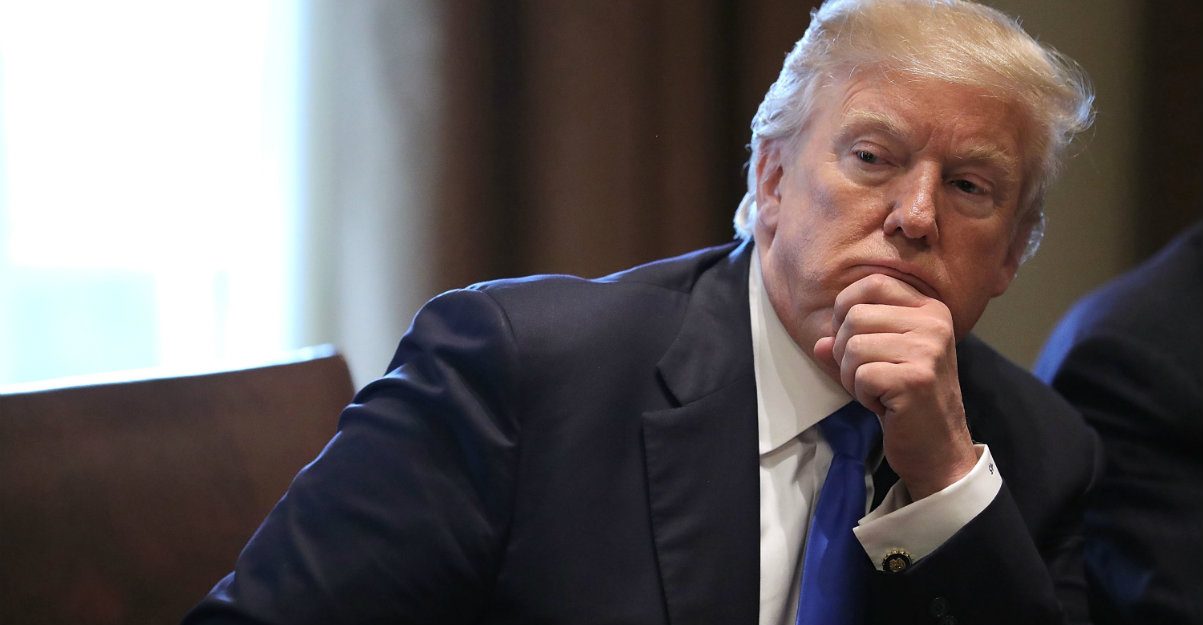
President Donald Trump‘s claim that the American president is imbued with the legal ability to pardon himself is clearly contradicted by the Department of Justice on the agency’s own website.
On Monday at 8:35 a.m., the 45th president tweeted:
As has been stated by numerous legal scholars, I have the absolute right to PARDON myself, but why would I do that when I have done nothing wrong? In the meantime, the never ending Witch Hunt, led by 13 very Angry and Conflicted Democrats (& others) continues into the mid-terms!
Speculation immediately ran rampant as to the president’s precise legal theory and exactly which legal scholars’ theories are undergirding this somewhat controversial interpretation of executive power. Law professor Jonathan Turley put himself in the pro-Trump interpretive corner while cautioning against the exercise of such power. Law&Crime‘s Elura Nanos added that such an outcome was probably possible, but warned that it might lead to Trump’s immediate impeachment.
Longtime liberal attorneys Laurence Tribe and Norm Eisen, along with Richard Painter approached this issue in an op-ed for the Washington Post last year and unsurprisingly came out against Trump’s interpretation of the executive’s constitutional prerogatives vis-à-vis the pardon power. Those three lawyers reiterated their previous opinion after Trump tweeted and fellow travelers followed suit.
Meanwhile, David Frum, a Never-Trump-style conservative and former George W. Bush administration official, predictably weighed in against Trump’s potential self-pardon by citing himself calling Trump an “authoritarian leader.”
Reasonable people, therefore, might find themselves wondering what the actual answer here is. To be clear: since this is absolutely untested law, no one really knows. But for those inclined toward looking to some sort of precedent, the Department of Justice itself is very clear on the matter.
In a memo dated August 5, 1974 and authored by Acting Assistant Attorney General, Mary C. Lawton, the DOJ notes, “Under the fundamental rule that no one may be a judge in his own case, the President cannot pardon himself.”
The memo continues:
Pursuant to Article II, Section 2 of the Constitution, the “Power to grant Reprieves and Pardons for Offenses against the United States, except in Cases of Impeachment,” is vested in the President. This raises the question whether the President can pardon himself. Under the fundamental rule that no one may be a judge in his own case, it would seem that the question should be answered in the negative.
Lawton’s analysis isn’t particularly lengthy; the entire memo tops out at just shy of three full pages. In the memo, Lawton raises–then immediately dismisses–the possibility of applying the necessity doctrine to a situation that might result in an attempt at a presidential self-pardon.
Under U.S. law, the necessity doctrine arises when all of the potential judges in a matter would seemingly be disqualified from ruling on a case before them because all of those (otherwise appropriate) judges have some sort of vested interest in the case’s outcome. Necessity, then, would seem to dictate that justice can only be served if the judges actually do decide the case–so the disqualification rule is set aside or relaxed to a certain extent. (This is the holding from Evans v. Gore.)
Lawton determines that the necessity doctrine is inapplicable to the situation of a sitting president facing criminal charges. She concludes, “It is, however, extremely questionable whether that doctrine is pertinent where the deciding official himself would be directly and exclusively affected by his official act.” To support her conclusion, Lawton cites Tumey v. Ohio, a case where it was determined that a defendant being tried by a judge with a “direct, personal, substantial,” interest in convicting said defendant amounts to a violation of due process of law.
The Constitutional firmness of a self-pardon, per the DOJ, is a bit squishy.
But Lawton’s memo also provides an interesting sort of out on the matter. She notes:
A different approach to the pardoning problem could be taken under Section 3 of the Twenty-Fifth Amendment. If the President declared that he was temporarily unable to perform the duties of his office, the Vice President would become Acting President and as such he could pardon the President. Thereafter the President could either resign or resume the duties of his office.
While perhaps even more far-fetched, this end-run around pesky Constitutional issues might prove to be a persuasive and tempting way forward for President Trump should the sky begin to fall. Under this presidency, it’s incumbent upon all of us to remember Kevin Garnett‘s prophetic words upon winning the 2008 NBA Championship, “Anything is possible.”
[Image via Chip Somodevilla and Getty Images]